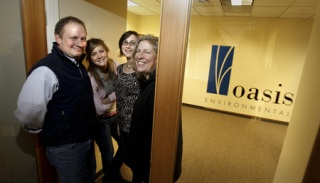Unknown to most islanders, tucked away in a second-story office space in the Bainbridge Village Shopping Center is a small branch of one of the largest environmental consulting firms in the world.
Oasis Environmental, an Alaska-based consultant primarily for oil/gas and mining powerhouses such as British Petroleum and Teck Comico, respectively, has had a small numerical presence on the island for nearly 10 years. Most of Oasis’s 90-plus employees work in its Anchorage headquarters, but the work of the seven who toil in the company’s only Washington State office shouldn’t be overlooked.
In terms of maintaining the company’s goal of helping clients minimize environmental impacts and risks world-wide, the island’s Oasis staff is an equally important cog in providing information and expertise for corporations whose proclivity in the not-so-recent past was to plunder natural resources with little concern about the effect of their actions on the environment.
That started to change, at least for the more responsible corporations, about 10 years ago with the creation of an environmental management standard (EMS) called ISO 14001. It established a set of requirements to help a variety of organizations protect the environment, prevent pollution and generally improve a company’s environmental performance.
Until then, Oasis was a small firm that specialized in external regulatory compliance work, primarily for oil companies working the North Slope of Alaska.
Robert Newman, who is the principal consultant in the Bainbridge office, said recognition of the importance of ISO 14001 led to the rise of Oasis and a few other consulting firms after clients realized the competitive advantage – and money – that could be gained by adopting a holistic approach to environmental management. It’s a business model that is beginning to flourish today even for the smallest of business models.
Essentially, Oasis identifies for each client “what can be done by them with environmental management baselines that allow continuous improvement of their performance over time,” Newman said. “Basically, we ask, ‘How can we be of value to the client?’”
Job efficiency and less degradation of natural resources is often the result of a corporation becoming more socially responsible on a range of environmental issues, whether it’s helping workers in a copper mine understand the importance of using safer, less deleterious tools to extract a resource or helping senior management or shareholders realize the advantage of risk management when drilling for oil in a Persian Gulf oilfield.
The advance of database technology and the subsequent ability to quickly communicate problems and solutions to clients has helped fuel a business boom for Oasis, as well as allowing employees such as Newman to move his workplace from Bellevue to his hometown of Bainbridge (his wife grew up here).
Aided by talented programmers, Oasis scientists perform a thorough environmental assessment of a client’s site, then the data is meticulously analyzed in order to “elevate the understanding” of what issues need to be addressed at the site.
Still, field work is a critical part of the business’s success because the collected data must be accurate and reliable. When Oasis gets involved in operations at a specific work site, for example, its consulting work is no longer abstract.
“We do our homework about requirements and consequences, inputs and outputs,” Newman said. “We go out and work with oilfield workers on the North Slope or miners in a copper mine in B.C. We understand what the issues are involving the workers and the work area, management and the union. It’s important that we know facts first. We break down what they do, usually just through conversations, but also when we’re involved in a training process. We did a gold mine in Alaska where we helped reduce and then eliminate harmful environmental practices,” essentially by helping workers learn how to enhance their own performances.
Often their clients manage large workforces in environments and trades that can be dangerous. When the EMS system is working at its best, it can be a savior, whether it’s helping to save the lives of workers, the environment or millions of client dollars.
While most of the company’s work is for the likes of the Kuwait Oil Company or ENSCO (a global offshore drilling firm), the Bainbridge office makes sure it has a level of presence on it home turf. For example, Krista Webb, a senior scientist in the Bainbridge office, does some mitigation work for island and Kitsap County developers.
“Local permitting work doesn’t provide a lot of money,” she said, “but it lets me get out there and be a biologist. I’ve done some wetland analysis on single-family parcels, too. Nothing controversial, but it’s always important to make sure that what you do is fair and accurate. While you may be working for the property owner, you need to have the respect of the regulators, too. Ultimately, we are stewards of the environment.”
The other five employees in Bainbridge, most of whom are youngsters not long out of college, have expertise in various disciplines — including biology and other science-related training, business sustainability, environmental studies, programming and communications.
Just as do their fellow workers in Oasis offices in Alaska or Montana, they balance a variety of jobs and environmental issues. Their breadth is wide, but include EMS projects, green buildings, wetlands, shorelines, sustainable manufacturing products, refineries and fuel stations, oil wells, mines, audit assessments and database applications involving sites located in Europe, the Middle East, North America, South America and Asia.
Exciting work, Newman and Webb believe, but it’s also matters that their lifeline to much of it is only a couple of miles away from their island homes.


